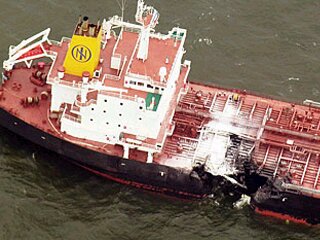BALTIC CARRIER, off Denmark, 2001
29 March 2001

Incident
On 29th March 2001, the chemical/product tanker BALTIC CARRIER (23,235 GT; 2000 built) collided with the bulk carrier TERN (20,362 GT; 1973 built) in the Baltic Sea between Germany and Denmark, 30 NM north east of Rostock. Neither vessel sank, but approximately 2,700 tonnes of heavy fuel oil was lost from BALTIC CARRIER’s cargo of some 30,000 tonnes. The spilled oil was driven north west by wind-induced currents towards Denmark, where it began to come ashore on the same day. The affected shorelines were predominantly sandy beaches, although a number of marsh areas received heavy oiling along the water line.
Response
The Danish Coast Guard responded to the spill with several of its own vessels and others requested from Germany and Sweden. Due to the nature of the spilt oil, mechanical grabs were used to recover the oil/water mix, rather than conventional skimmers. The shallow nature of many of the oiled areas limited the ability to conduct water-based recovery operations even using shallow-draught vessels; excavators and front-end loaders were in places able to operate directly in the water to recover oil.
Booms were used to protect the economically and ecologically sensitive areas, and to contain and corral floating oil for recovery. The offshore response was terminated on 2nd April, when it was determined that no more floating oil could be found in open water areas accessible to large vessels. It was estimated that approximately a third of the released oil was recovered at sea.
The shoreline clean-up involved several hundred people, including emergency corps (conscripts), police and soldiers, municipal workers, local contractors, local volunteers and members of environmental groups. Manual recovery was necessary in areas not accessible by heavy equipment, along slightly-oiled beaches, as well as in areas with rocky/cobble substrate or in more sensitive environments.
The emergency response phase was formally completed on 9th April. In accordance with Danish policy, responsibility for fine cleaning, including cutting of oiled marsh grasses, was then formally transferred to the individual municipalities.
More than two thousand bird casualties were reported. Bird washing efforts were not made, given Danish policy and the fact that the birds died before they could have been brought into any washing facilities.
The incident qualified under the Civil Liability and Fund Conventions, although costs did not exceed the shipowner’s limit of liability.
ITOPF Involvement
ITOPF was requested to attend on site by the P&I Club, and provided advice on at sea and shoreline response techniques, waste management, and potential fisheries impacts due to contamination of stocks and oiling of gear.
Assistance was provided to the P&I Club for the assessment of claims from various parties.
Links
Categories: Denmark, Oil, Product Tanker, Europe
